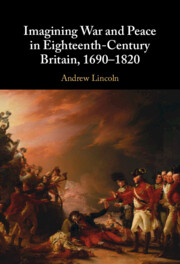Book contents
- Imagining War and Peace in Eighteenth-Century Britain, 1690–1820
- Imagining War and Peace in Eighteenth-Century Britain, 1690–1820
- Copyright page
- Dedication
- Contents
- Figures
- Preface
- Introduction
- Part I Developing Ideals
- Part II Developing Questions
- Part III War and Peace in an Age of Revolutions
- Part IV The Landscape of Conquest
- Chapter 11 A Case Study
- Further Reading
- Index
Chapter 11 - A Case Study
Gibraltar
from Part IV - The Landscape of Conquest
Published online by Cambridge University Press: 10 January 2024
- Imagining War and Peace in Eighteenth-Century Britain, 1690–1820
- Imagining War and Peace in Eighteenth-Century Britain, 1690–1820
- Copyright page
- Dedication
- Contents
- Figures
- Preface
- Introduction
- Part I Developing Ideals
- Part II Developing Questions
- Part III War and Peace in an Age of Revolutions
- Part IV The Landscape of Conquest
- Chapter 11 A Case Study
- Further Reading
- Index
Summary
This considers Gibraltar as a special case in the history of Britains developing empire. Captured by an Anglo-Dutch fleet in 1704, assigned to Britain in the 1713 Treaty of Utrecht, the rock was devoid of the resources and potential for agricultural development that might justify the violence entailed in its conquest. This was a problem for an early observer (the poet John Breval, who described the place in Calpe, 1717), but the development of a taste for unimproved and mountainous landscapes, and a more confident sense of British power as civilizing, made it easier for later observers to justify British possession. The great siege of Gibraltar (1779-1783) cemented the rocks status as British: its bare features acquired an iconic status as a symbol of British independence and freedom, a reference point that could be evoked in the context of other imperial conquests.
- Type
- Chapter
- Information
- Imagining War and Peace in Eighteenth-Century Britain, 1690–1820 , pp. 261 - 280Publisher: Cambridge University PressPrint publication year: 2023



